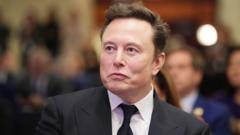Billionaire entrepreneur Elon Musk has set the stage for a dramatic Supreme Court election in Wisconsin by distributing $1 million (£770,000) cheques to voters. This giveaway occurred after the state's Supreme Court declined to step in against the controversial initiative. Musk's announcement came right before the election, which is poised to become a crucial factor in determining control of Wisconsin's high court.
The move has drawn the ire of the state's Attorney General Josh Kaul, a Democrat, who filed a lawsuit claiming the giveaway violates Wisconsin's laws prohibiting gifts in exchange for votes. He argued that the act of gifting money in the context of an election raises serious ethical concerns. However, Musk's legal team countered by asserting that Kaul's actions infringe upon Musk's right to free speech, framing the challenge as an attempt to stifle political expression.
At a rally held on Sunday evening, Musk reiterated his beliefs about the judiciary, stating, “we just want judges to be judges,” as he distributed two cheques to voters who participated in a petition meant to curtail what Musk described as "activist" judges. Musk's lawyers have characterized the cheques as a means to foster grassroots dialogue rather than an explicit means to sway votos in favor of any candidate.
Despite Kaul's persistent efforts, including appeals to the Supreme Court requesting an intervention, the justices unanimously opted not to engage with the case. Musk has thrown his support behind conservative candidate Brad Schimel, hoping to shift the court's dynamics away from its traditionally liberal inclination. Schimel is competing against Susan Crawford, a candidate endorsed by the state’s liberal justices.
This election is viewed by many political analysts as a critical referendum related to the influence of former President Donald Trump. As significant decisions loom regarding abortion legislation, redistricting, and voting rights that could impact future elections, interest in the outcome of this contested race is high. Musk has contributed a staggering $14 million to Schimel's campaign, with the total expenditure for this judicial race reaching an unprecedented $81 million.
In recent developments, Schimel has distanced himself from Musk's actions, stating he was unaware of the rally or its intentions. This isn’t the first time Musk has engaged in such promotional tactics; he previously offered monetary prizes in six battleground states last year, which were deemed legal by a Pennsylvania judge. This latest controversy underscores the complexities of campaign finance laws and the ongoing debate surrounding the intersection of wealth and influence in American politics.




















